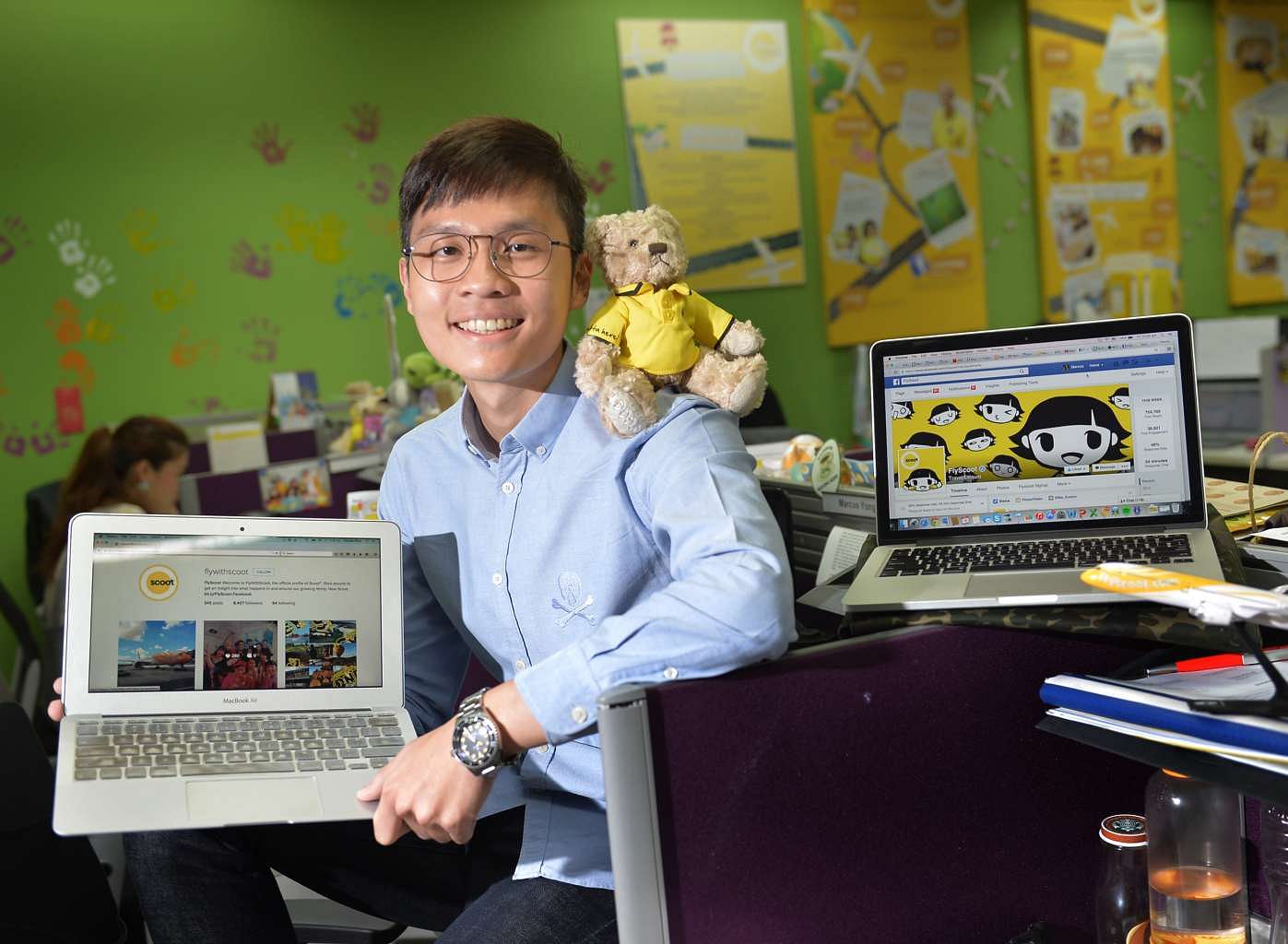SEO specialist? Check out 4 'millennial jobs' that did not exist
With the rise of technology and increased environmental awareness, new occupations such as search engine optimisation specialists and sustainability officers have been created




Would you have heard of user experience designers before the turn of the millennium? How about a search engine optimisation specialist? Or social media analysts?
Chances are, these jobs - which are increasingly in demand these days - probably did not exist or were unheard of 15 years ago.
Since 2000, new jobs such as app developers, social media officers and search engine optimisation specialists - who help businesses increase their rankings on online search engines, typically by assisting in the business' web design - have popped up.
Singapore's Economic Development Board has also identified data analysts, user experience designers, design or innovation managers, design researchers and futures advisors as new jobs in the past 15 years. Some of these jobs emerged due to technological developments, while others, such as sustainability officers, came about because of rising environmental awareness.
The emergence of new jobs is not surprising, say experts. What is interesting is the variety and speed at which they are entering the mainstream labour market.
Mr David Leong, 45, managing director of recruitment firm PeopleWorldwide Consulting, says: "As technology advances, new jobs will emerge to replace older ones relying on existing technology.
"But with technology advancing at a faster rate, the labour market has probably changed more in the last 15 years compared with the 50 years before that. It looks like it might change even more quickly in the future."
Experts say the biggest influence on the job market in recent years is probably the Internet explosion.
Although said to have been developed as early as the 1960s, the Web saw mass adoption in the late 1980s and 1990s and has since influenced almost every aspect of life.
The Internet's exponential growth, fuelled by the development of mobile devices such as smartphones, has also led to the rise of related technologies such as social media. Some milestones - Google was founded in 1998, Facebook was launched in 2004 and the first iPhone was released in 2007.
More than three billion people - 43 per cent of the world's population - use the Internet, according to the United Nations International Telecommunication Union.
Says Associate Professor Sarah Cheah of the National University of Singapore Business School: "From being a unique medium for locating and exchanging information, the Internet has evolved into a main platform where e-commerce takes place and peers connect with one another through social networks. The Internet's appeal to consumers has surged to unimaginable heights.
"It is, therefore, not surprising that companies and agencies have introduced new organisational processes, structures and roles to capture the burgeoning e-commerce market."
And for many businesses and organisations, social media has become a crucial element of their customer-engagement strategies.
Banks, airlines and government agencies hire executives to handle their social media accounts.
For example, when OCBC Bank set up its Twitter account in 2011, it was managed by one employee. Today, it has more than 10 full-time staff working on platforms such as Facebook, Instagram and LinkedIn, and handling aspects such as strategic planning and governance, brand management, content marketing and customer service.
Other jobs that have rode the technology wave include app developers and search engine optimisation specialists, who can be employed by companies or operate as independent contractors.
Apart from technological advancements, experts say a growing awareness of environmental issues in recent decades has led organisations to employ a sustainability officer to champion and monitor sustainability efforts.
For example, under a government initiative last year, each ministry is required to appoint a sustainability manager to drive sustainability improvements within the ministry and its statutory board, among other tasks.
Mr Erman Tan, 51, president of the Singapore Human Resources Institute, says: "In the past, responsibilities involving sustainability rested with the facility manager.
"But as sustainability initiatives have now expanded beyond the facility - to include the company's overall strategy and product marketing philosophy - the position has increased in importance and now has its own title."
So what does the emergence of new jobs mean for job seekers?
Polytechnics and universities say they are aware of the changes in the job market and are preparing their students to take advantage of new opportunities.
For example, in 2011, NUS introduced a multi-disciplinary environmental studies degree programme to produce professionals with the skills to understand and address complex modern environmental issues.
That same year, Singapore Polytechnic introduced a module on social media marketing to prepare its business information technology students for new jobs such as social media officers.
Last year, the school also launched a social media listening centre in its premises so that students can learn how to use social media monitoring tools, manage a company's online reputation and execute a social media marketing campaign.
In 2012, Ngee Ann Polytechnic started a digital media communications specialisation option - which includes modules such as social media strategy, content design for mobile devices and integrated digital media - under its diploma in mass communication.
In recent years, Nanyang Polytechnic has also introduced courses in mobile computing, analytics, social computing, cyber security, Internet and cloud computing, to equip students with the skills to meet the changing needs of the working world.
Its specialist diploma in mobile computing, introduced in 2013, and its diploma in infocomm and digital media, introduced in 2011, are over-subscribed.
Mr Dennis Ang, director of the polytechnic's school of information technology, says: "To address future industry needs, Nanyang Polytechnic constantly keeps abreast of the ever changing industry landscape through our strong links and collaborations with the industry.
"We also have industry leaders on our advisory committees to provide feedback and advice on current and future trends. Their feedback helps shape our curricula to ensure that our students graduate with the relevant industry skills and knowledge."
App developer

Estimated monthly salary
$4,000 to $5,000
Minimum qualifications
• A degree or diploma in IT or related fields and a good foundation and experience in mobile application development on platforms such as iOS, Android or Windows.
• Ability to solve complex programming problems.
From an app to determine the time one's bus will arrive to an immersive virtual reality app for a property firm - these are some of the products by home-grown digital marketing and mobile app development house Originally Us.
It is among several Singapore firms that develop apps, which emerged after the mass adoption of smartphones in the late 2000s.
Co-founded by Mr Calixto Tay Wei Kiat, 27, it has created more than 30 apps for hospitality groups, property firms and government agencies since starting last year.
One of its most successful apps is SG BusLeh, which informs users how long it will take for their bus to arrive and displays the approximate physical location of the bus.
Launched in May, the free app is the highest-rated bus app from Singapore on the Android store. It is also available on iOS.
Mr Tay, who is married with no children, says: "We are quite proud of this app because it is practical and relevant to the local market. Some users say it is funny because it uses some Singlish terms. We hope to create more apps like this."
He is working on another app that functions as a mobile point- of-sale system built for food and beverage establishments.
Instead of having waiters scribble orders on paper, the orders can be entered into the app on a mobile device and the information relayed directly to the kitchen.
Mr Tay's interest in software design started in his school days. In Secondary 1, he wrote codes to make his computer do things such as automatically open the CD drive or specific browsers.
And while doing project work, he wrote a program similar to Google Docs, which allowed his classmates and him to edit the same document at the same time.
He says: "I just love programming. If you know the right codes, you can basically program a device to do anything."
After graduating summa cum laude (with highest distinction) from the Singapore Management University with a degree in information systems management two years ago, he was the IT manager in a food company briefly before starting Originally Us.
The firm employs 10 staff, including three project managers and four other app developers.
Mr Tay says his job is to transform a client's ideas into a working, useful and well-designed mobile app.
About 80 per cent of his work involves coding new functions for apps. The rest goes towards testing the functions and fixing issues.
People underestimate the time and manpower needed to build an app, he adds.
"The reality is that creating an app takes anything from a month to a year, depending on its complexity. It also often takes two or more people as we are experts in different areas of app creation."
Finally, Mr Tay has a note of caution for wannabe app developers: "You have to really love codes and devices because those are what you will be looking at all the time."
Sustainability officer

Estimated monthly salary
$6,000 to $8,000
Minimum qualifications
• A degree in environmental management, sustainable urban solutions, science, engineering or a related field.
• Have an in-depth knowledge of sustainability and a passionate interest in sustainable solutions.
If you are a regular shopper at Ikea, you would notice that the furniture retailer has long ditched plastic bags in favour of reusable carrier bags sold at 90 cents each.
You may also have dropped a light bulb or two into the light bulb recycling stations at its stores in Alexandra and Tampines.
These are just some of the measures implemented by the team led by Dr Lee Hui Mien, 35, head of sustainability for the Singapore, Malaysia and Thailand branches of Ikea.
Dr Lee, a graduate from Nanyang Technological University, who has a PhD in electrical and electronic engineering, took on her current role 21/2 years ago. Before that, she was a researcher in a government agency.
A nature lover who enjoys hiking, she says that people often have the misconception that sustainability issues can be reduced to just emotional treehugging and that the industry attracts impassioned eco warriors.
But going green is part of a company's overall corporate strategy. Dr Lee says: "It is about striking a balance between the company's progress and its costs, as well as the impact on the environment."
Sustainable practices can eliminate waste and generate cost savings, leading to a stronger bottom line.
For example, Dr Lee's team works with the company's facilities and maintenance department to manage and reduce the consumption of energy, water and waste.
Eco-friendly businesses often enjoy good publicity and greater customer loyalty.
"One of my colleagues likes to say we are the good karma of the company," she says.
They also conduct workshops for new staff on the importance of sustainability and spearhead social initiatives such as helping to pack unsold food to distribute to the needy and - yes - plant trees in parks.
In addition, Dr Lee is working on a project to recycle the waste oil in Ikea's restaurants by turning the oil into biodiesel that can be used for the store's delivery vans.
To be a good fit for a job in sustainability, one needs to be innovative, patient, determined and passionate about the environment and society, she says.
Dr Lee, who is in a relationship, adds: "I love that my job is meaningful - I help improve the lives of people, the environment and also help the business.
"This gives me a sense of fulfilment and purpose."
Social media officer

Estimated monthly salary
$4,000 to $6,500
Minimum qualifications
• Possess good copywriting skills, creativity, a sense of humour and an experimental mindset.
• Have good data analysis and interpretation skills and savvy with social media.
• Having a technology- or communication-based degree is an advantage.
Facebook, Twitter, Instagram - Mr Marcus Yong, 28, is on top of them all.
The assistant manager of digital marketing at budget airline Scoot is the king of social media at the company.
He drives all aspects of its digital marketing, including its promotion announcements, such as the airline offers that appear on Facebook feeds.
Mr Yong, who decides how tweets and Facebook and Instagram posts are worded, also oversees a team of community managers who handle and monitor Scoot's social media pages.
Scoot has more than 970,000 "likes" on Facebook, more than 10,000 followers on Twitter and 9,000 Instagram followers.
The Nanyang Technological University communication studies graduate, who joined the airline in January, says: "I chose this job because I want to make a difference. And in digital marketing and social media, I can see the effects of my work very quickly."
His job is to "create buzz and interest" in Scoot's services and products in a creative way.
In February, this meant capitalising on the immense online interest about whether a dress was blue/ black or white/gold. He says: "We wanted to create a game around this issue since everyone was talking about it."
So Scoot invited netizens to vote. If more people voted blue/black, the airline would release deals for flights to Bangkok, Seoul, Qingdao, Shenyang, Gold Coast and Perth.
If more people voted white/gold, it would release deals for flights to Hong Kong, Taipei, Tokyo, Nanjing, Tianjin and Sydney.
The result? The camps were almost equal in size and Scoot gave out deals to all the destinations.
Mr Yong, a bachelor, says: "In this way, we engaged more than 700 fans and helped brand ourselves as fun and vibrant."
When customers have queries, social media is also one way through which the airline can help.
For example, there have been cases of customers sending the airline a Facebook message saying their flight was in an hour and their booking could not be found in the airline's system.
"Social media allows us to quickly put them in contact with the guest relations department, which can help these customers," Mr Yong says.
The job's drawback is that he sometimes has to deal with netizens who are angry or emotional.
He says: "I've learnt that even if someone is very nasty on social media, we shouldn't get defensive. Rather, we should just try to be as helpful as we can. And sometimes, we just have to roll with the punches."
While he also handles Scoot's marketing through other channels such as e-mail marketing and online advertising, he finds his work with social media particularly exciting.
"It's fast, challenging, dynamic," he says. "And it's fun."
Search engine optimisation specialist

Estimated monthly salary
$3,500 to $5,000
Minimum qualifications
• Degree in any discipline, with knowledge and experience in search engine optimisation and proficiency in Web technologies such as HTML, CSS and XML.
Want to be number one on the Google search engine?
Mr Alan Koh is your man.
The 32-year-old is the founder, principal trainer and consultant at Impossible Marketing, a homegrown Internet marketing company.
It specialises in taking websites to the top of online search results, meaning more Web traffic and leads for the businesses.
Started in 2013, the company has nine staff. Past clients include doctors, event organisers, property agents and various other businesses.
Mr Koh has a business finance degree from RMIT University in Melbourne, Australia.
From 2010 to 2012, he was a mortgage broker, but his business failed from a lack of customers and strong competition.
"The experience taught me the importance of having leads - potential sales contacts that can lead to a closed deal.
"If more people had chanced upon my business online through search engines, I might have had more leads and more clients," he says.
"That was when I became fascinated with search engine optimisation. I turned my attention towards it and now I help other businesses get more leads by being more searchable online."
Most of his clients want to reach the first page of results. This, he says, is achievable if they tailor their websites to fit the algorithms of search engines.
He says: "The secret is knowing what phrases users search for and including them in your website."
For example, one of his clients - an aesthetic doctor - wants to promote a website featuring a new procedure called "particle free dermabrasion".
He says: "Nobody searches for this phrase, so I'm redesigning his website to include words such as 'skin treatment' and 'smooth skin' to improve its search results."
Apart from providing consultancy services, he also conducts seminars on Internet marketing.
One participant, who attended a two-day seminar in November last year conducted by Mr Koh, is Mr Benny Chow, 28, chief marketing officer of local photography company Firefly Photography Singapore.
Mr Chow says: "I applied Alan's principles to my website. Now it comes out on top whenever someone searches for photography services in Singapore and my business has increased by 30 per cent."
But getting a website up the ranks takes time, says Mr Koh, whose wife is his company's business development manager.
He says: "It takes about three months for search engines to be confident that your website is reliable and regularly updated.
"Some clients are anxious to get results, so I have to manage their expectations.
"But when I see a client's website ranked at the top of Google search results, it gives me a great sense of accomplishment."
•Estimated monthly salaries and minimum qualifications in the stories are given by the Singapore Human Resources Institute.
Join ST's Telegram channel and get the latest breaking news delivered to you.
A version of this article appeared in the print edition of The Sunday Times on November 15, 2015, with the headline SEO specialist? Check out 4 'millennial jobs' that did not exist. Subscribe

